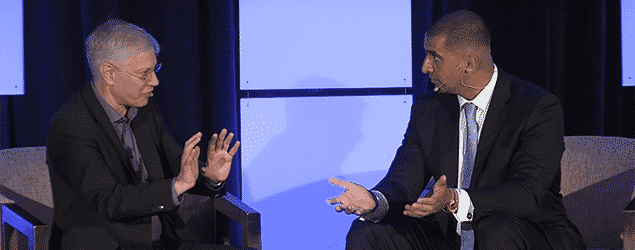Anniversary Chapters: Tara Smith Discusses “Humanity’s Darkest Evil”

“It’s a little surprising to say in retrospect, but until writing my chapter on law — a subject that Robert Mayhew suggested to me — I hadn’t given much thought directly to the nature of law in Atlas Shrugged,” said Tara Smith, referring to a chapter she contributed to Mayhew’s book Essays on Ayn Rand’s “Atlas Shrugged.”
“Robert proposed the topic around the time I was just beginning to focus some of my research on philosophy of law,” Smith said, “and while I certainly ‘got’ the ridiculous injustice of the laws that were passed in Atlas, I think I had been so absorbed in other areas of the story — the characters, their moral struggles, the general political climate — that I missed what I now view as a really insightful portrait of non-objective law.”
The result of Smith’s new focus was “‘Humanity’s Darkest Evil’: The Lethal Destructiveness of Non-Objective Law,” the subject of our next author interview in a series celebrating the 60th publication anniversary of Ayn Rand’s Atlas Shrugged.
“Rand’s depiction is not simply of misguided political ideals, plentiful though those are in the novel,” Smith explained. “Her examples also make very clear the particular destruction that is wrought by laws that are not objective, by ‘meanings’ that are malleable or mysterious — left to the eye of the beholder — by legal officials who manipulate their application of law to serve ulterior ends. Obviously, there’s more than this at work — yet almost as an aside, in the course of laying out her most fundamental ideas in more basic areas of philosophy, Rand manages to say something profound about law. That’s pretty amazing.”
Smith’s essay begins by naming the essential nature and value of objective law, without which the phenomenon of non-objective law cannot be understood. This useful survey touches on the rule of law, the nature of objectivity, the nature of rights, the purpose of government, the destructiveness of force, and man’s need for government — and includes a fresh discussion of why Rand was not an anarchist.
Her discussion of non-objective law drills down into the fictional events of Rand’s magnum opus, analyzing such plot points as the Anti-dog-eat-dog Rule, Directive 10-289 and an economic emergency law, detailing their destructive effects on the characters’ ability to remain productive and moral. Lest a reader come away thinking that the novel’s fictional laws are too far-fetched, Smith also draws parallels with actual U.S. laws in the fields of regulation, antitrust and lobbying. Nor is non-objective law treated solely as an economic destroyer. “The spiritual destruction of non-objective law is also evident in its emotional toll,” Smith writes. “Non-objective law’s systematic evisceration of the conditions of human life drains natural motivation.”
Here’s an excerpt that sums up the chapter’s theme:
A proper legal system is constructed to serve the proper function of government. Objective law is validated by its service to that end: the protection of individual rights. Non-objectivity, whether in law’s content or in its implementation, subverts the law’s ability to fulfill that function and reflects the opposing dictum that might makes right. For any failure of objectivity means that government power is being used to serve alternative, illicit ends. As such, non-objective law converts the would-be guardian of man’s freedom into an additional threat to it. Under the guise of protecting man’s rights, law that is not objectively valid uses the government’s monopoly on force to violate his rights. In this way, non-objective law represents evil of the most lethal sort: the unjustified use of force. Given that human life depends on reason and on the freedom that makes reason possible, the unjustified use of physical force, by paralyzing its victim’s mind, cripples a man’s means of survival; it attacks his capacity to live. This is a dark evil, indeed.
Tara Smith, a professor of philosophy at the University of Texas – Austin, is the BB&T Chair for the Study of Objectivism and holds the Anthem Foundation Fellowship. She is also a member of the board of directors of the Ayn Rand Institute and the author of Judicial Review in an Objective Legal System, among other books.
If you find these perspectives intriguing, Essays on Ayn Rand’s “Atlas Shrugged” is available here, and more on Atlas Shrugged is available here.



